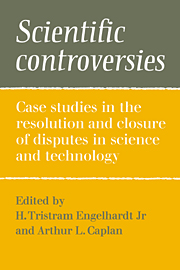 Scientific Controversies
Scientific Controversies Book contents
- Frontmatter
- Contents
- Preface
- List of contributors
- Introduction: Patterns of controversy and closure: the interplay of knowledge, values, and political forces
- PART I THEORETICAL PERSPECTIVES
- 1 Ethical theory and the problem of closure
- 2 Scientific controversy and its termination
- 3 The political anatomy of controversy in the sciences
- 4 Controversies involving science and technology: a theoretical perspective
- 5 Politics, public policy-making, and the process of reaching closure
- 6 The role of experts in scientific controversy
- 7 The continental drift debate
- 8 How history and politics affect closure in biomedical discussions: the example of the Soviet Union
- 9 Scientific disputes over policy
- 10 Controversies and the authority of science
- 11 Post-Skinner and post-Freud: philosophical causes of scientific disagreements
- PART II CONTEMPORARY CASE STUDIES
- PART III CONTROVERSY, CLOSURE, AND THE PUBLIC
- Author index
- Subject index
9 - Scientific disputes over policy
Published online by Cambridge University Press: 03 February 2010
- Frontmatter
- Contents
- Preface
- List of contributors
- Introduction: Patterns of controversy and closure: the interplay of knowledge, values, and political forces
- PART I THEORETICAL PERSPECTIVES
- 1 Ethical theory and the problem of closure
- 2 Scientific controversy and its termination
- 3 The political anatomy of controversy in the sciences
- 4 Controversies involving science and technology: a theoretical perspective
- 5 Politics, public policy-making, and the process of reaching closure
- 6 The role of experts in scientific controversy
- 7 The continental drift debate
- 8 How history and politics affect closure in biomedical discussions: the example of the Soviet Union
- 9 Scientific disputes over policy
- 10 Controversies and the authority of science
- 11 Post-Skinner and post-Freud: philosophical causes of scientific disagreements
- PART II CONTEMPORARY CASE STUDIES
- PART III CONTROVERSY, CLOSURE, AND THE PUBLIC
- Author index
- Subject index
Summary
Each year, numerous committees of the National Academy of Sciences (NAS) provide policy-relevant scientific information in an apparently competent and reasonably disinterested manner, with only occasional charges of gross error or bias (Boffey, 1975; Schiefelbein, 1979). Thus for certain policy decisions which should be based in part on accurate technical information, adequate technical advice is obtainable if the pertinent questions fall within the state-of-the-art of our science. Increasingly, however, we see disputes between experts over the accuracy of scientific information. Usually these are complicated arguments, beyond the training of policymakers, so the only people capable of fully understanding them are other experts.
Experts involved in these disputes often have vested interests; for example, they may represent particular corporations, government agencies, or citizen action groups. It is by now well recognized that these experts' positions on what appear to be purely scientific points are correlated with their positions on related policy issues. Thus, scientists who oppose nuclear power calculate higher risks of cancer from a given level of radiation than do scientists who favor nuclear power (Mazur, 1981a).
These scientific disputes produce a clear dilemma for the policymaker. How does one make use of the expert's special knowledge without submitting to the expert's biases?
There are solutions to this problem that are currently being employed. A policymaker with personal biases may selectively depend on experts with similar biases. Or, one may simply ignore the scientific dispute, making policy on other bases, as when the courts adjudicate environmental suits on the grounds of whether or not a government agency has followed proper procedure, as specified in its enabling statute (Bazelon, 1979).
- Type
- Chapter
- Information
- Scientific ControversiesCase Studies in the Resolution and Closure of Disputes in Science and Technology, pp. 265 - 282Publisher: Cambridge University PressPrint publication year: 1987
- 3
- Cited by


